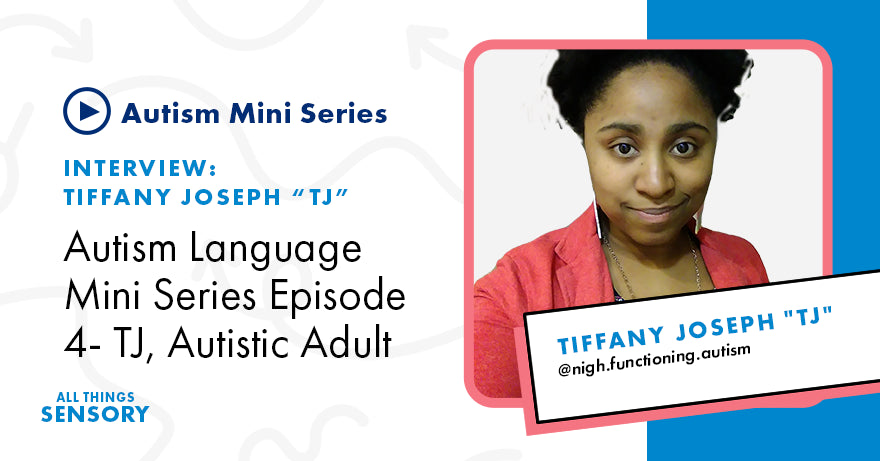Your Cart is Empty

April is Autism Acceptance Month. This month, we’re releasing one new episode each week, in addition to our regularly scheduled episodes. These episodes are all about the language surrounding Autism. We had the privilege of interviewing several people for this Mini Series and we’re excited for you to listen in!
Tiffany Joseph, TJ, is the creator of Nigh Functioning Autism, a play on words that makes fun of functioning labels. She is a communication teacher and paraeducator for elementary school aged students in special education.
TJ’s Instagram @nigh.functioning.autism
Learn more about TJ
We’d love to answer your questions on the podcast! Fill out this form -> https://harkla.typeform.com/to/ItWxQNP3
Looking for more in-depth help? Sign up for 2-on-1 Mentoring With Us!!
All Things Sensory Podcast Instagram
Harkla Website - Shop Sensory Products!
Language plays a powerful role in shaping how we understand and approach autism. Over the years, the terminology surrounding autism has evolved, reflecting societal understanding and advocacy changes.
To shed light on this topic, TJ, an autistic adult and mother of three neurodivergent children, shared her unique perspective on autism language and its impact on advocacy and education.
When discussing autism, terms like "autistic person" and "person with autism" are commonly used. These phrases reflect different perspectives, and preferences vary widely among individuals in the autism community.
TJ shared that while she prefers "autistic," she is not offended by "person with autism" or similar terms. She focuses on understanding and respecting personal preferences, whether they align with the broader community.
This inclusive approach is a valuable reminder to ask individuals about their preferences rather than assuming. TJ emphasized the need to balance respecting personal identities with recognizing broader community trends, allowing for a more compassionate dialogue about autism.
TJ noted that language is just one part of autism advocacy. While important, focusing too heavily on terminology can sometimes overshadow more significant issues, such as accessibility and societal acceptance.
“We have so many hearts and minds to change just to see us as human and worthy,” she said. This sentiment reflects a broader consensus among advocates: meaningful progress requires shifting attitudes and creating inclusive environments rather than fixating solely on words.
One poignant observation TJ shared is how generational differences shape language preferences. For instance, her autistic teenagers prefer the term "having autism," highlighting how personal and cultural factors influence language over time.
For parents, educators, and professionals, understanding how to approach autism language thoughtfully can foster better relationships and advocacy efforts. Here are some actionable tips inspired by TJ's insights:
When engaging with autistic individuals, ask them how they prefer to be referred to. Respect their choice, even if it differs from your usual terminology.
When mistakes happen, prioritize the intent behind the words. A willingness to learn and adapt often outweighs accidental missteps.
Remember that language is just one part of creating a supportive environment. Focus on meaningful actions like advocating for communication rights or improving accessibility in schools and workplaces.
Share the reasons behind language preferences in a way that fosters understanding rather than division. Building bridges is more effective than drawing lines.
Beyond language, TJ’s advocacy focuses on improving communication access for all. As a high-tech AAC user and educator, she helps families and schools implement speech-generating devices effectively.
These tools are critical for individuals who may not consistently use verbal speech, allowing them to express themselves in the best way for them. TJ’s passion highlights the broader need for inclusive education and communication practices.
TJ’s perspective on autism language underscores a vital lesson: while words matter, they should never overshadow the broader mission of acceptance, inclusion, and advocacy. By focusing on the humanity and individuality of autistic people, we can create meaningful change that extends beyond the limits of language.
Whether you’re a parent, therapist, or advocate, remember that understanding autism starts with listening—with our ears and hearts.
BORING, BUT NECESSARY LEGAL DISCLAIMERS
While we make every effort to share correct information, we are still learning. We will double check all of our facts but realize that medicine is a constantly changing science and art. One doctor / therapist may have a different way of doing things from another. We are simply presenting our views and opinions on how to address common sensory challenges, health related difficulties and what we have found to be beneficial that will be as evidenced based as possible. By listening to this podcast, you agree not to use this podcast as medical advice to treat any medical condition in either yourself or your children. Consult your child’s pediatrician/ therapist for any medical issues that he or she may be having. This entire disclaimer also applies to any guests or contributors to the podcast. Under no circumstances shall Rachel Harrington, Harkla, Jessica Hill, or any guests or contributors to the podcast, as well as any employees, associates, or affiliates of Harkla, be responsible for damages arising from use of the podcast.
Keep in mind that we may receive commissions when you click our links and make purchases. However, this does not impact our reviews and comparisons. We try our best to keep things fair and balanced, in order to help you make the best choice for you.
This podcast should not be used in any legal capacity whatsoever, including but not limited to establishing “standard of care” in a legal sense or as a basis for expert witness testimony. No guarantee is given regarding the accuracy of any statements or opinions made on the podcast.
Comments will be approved before showing up.